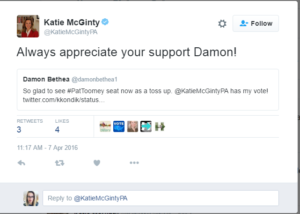McGinity is a Fresh Face in Social Media Politics
Democratic candidate Katie McGinty has created a campaign that seamlessly integrates the technology boom of the 21st century into her political career. McGinity is currently vying for one of Pennsylvania’s two Senate seats in the 2016 election cycle.
As the use of social media and the internet are relatively new tools to the field of politics, politicians and their staff can often find themselves at a loss when it comes to navigating social media correctly. However, McGinty’s use of social media has been in sparkling form, striking a balance between community engagement and promotion of her platform.
“Social media engagement has really come to be a pivotal part of campaign strategy,” said Jennifer Munns a recent American University graduate with a master’s degree in political communication, “it’s really only come to be so important in the last couple of years so watching it develop from a communications perspective has been really interesting.”
Munns explained that during a campaign cycle a politician’s social media feed can be just as persuasive to potential voters as a campaign ad or an email campaign.
Her Twitter bio reads, “Mom. Wife. Proud Democrat. Candidate for U.S. Senate,” a concise but clear collection of statements which defines McGinty, both as a political candidate and as a person. McGinty’s Twitter and Facebook essentially function as a launching pad for her political platform in which she shares promotional campaign materials and articles from across the web that align with her platform and personal beliefs.
For example, the candidate recently shared a New York Times article on her Facebook page about the difficulties Planned Parenthood has faced over the last several months, along with a statement on how Republicans have been the force behind many of the difficulties facing the non-profit group and stressed her belief that the government should be ensuring women’s access to health care, and that their decision to access such health care should remain a private and personal choice.
“Social media serves a dual purpose for campaigning politicians, it puts there platform out to the public on an easy to access forum, and it allows for interactions with supporters, voters, and critics,” said Munns.
McGinity also uses social media to regularly interact with potential voters, thus bridging the gap between McGinity’s status as a public figure and her potential constituents. Her effort to keep in contact with potential voters and her possible future constituents is a smart and strategic move. Through this social media strategy McGinty portrays that if elected her office will be one with open lines of communication.
In an attempt to further drive home the point that McGinity is a representation of the average Pennsylvanian her Facebook page also features posts regarding her family. She made a post celebrating her twin daughters’ birthday, wishing them well and hoping they have another happy and healthy year of life, just as many mothers across the country do for their children.
When asked about McGinty’s social media strategy and the role it has in her campaign, staff did not reply.
“What is really interesting, and highly useful to candidates seeking office, is that supporters who follow a candidate on social media and repost photos or event information to their own page or feed are giving that candidate free publicity,” Munns said, “even when people make their own posts stating their support for a candidate on social media it adds to their good publicity, of course it also has a negative effect when those who oppose a candidate makes a post.”
It is clear that a candidate’s social media strategy is starting to play a larger and larger role in overall campaign strategy, and is becoming a force of its own when it comes to reaching voters.


